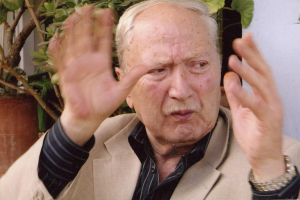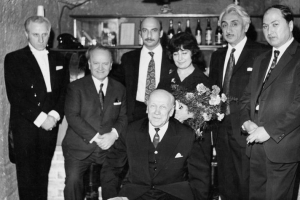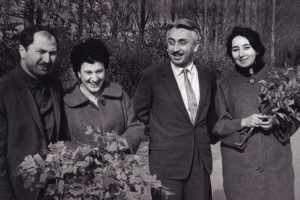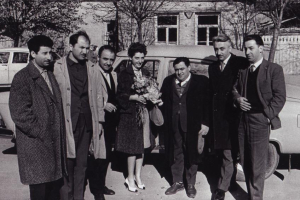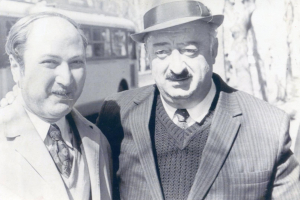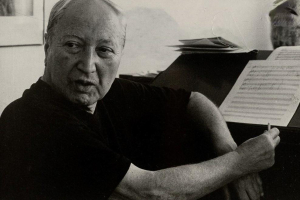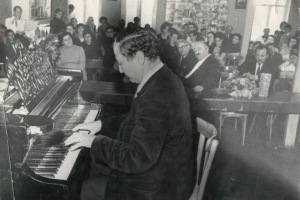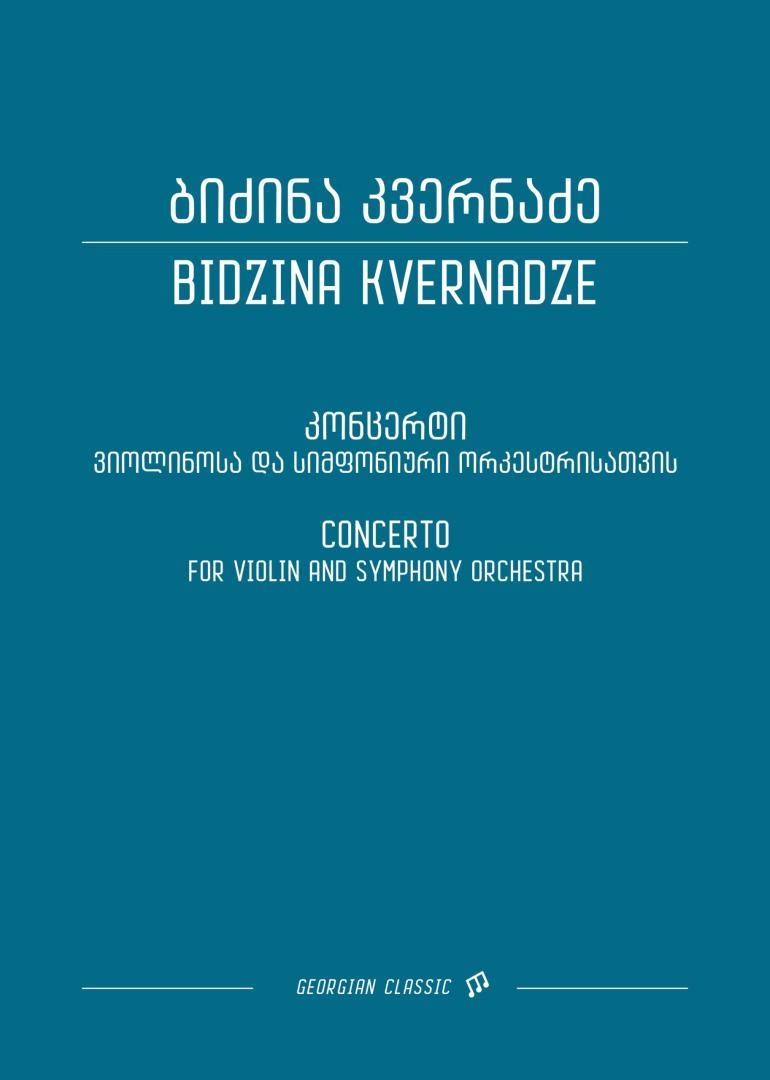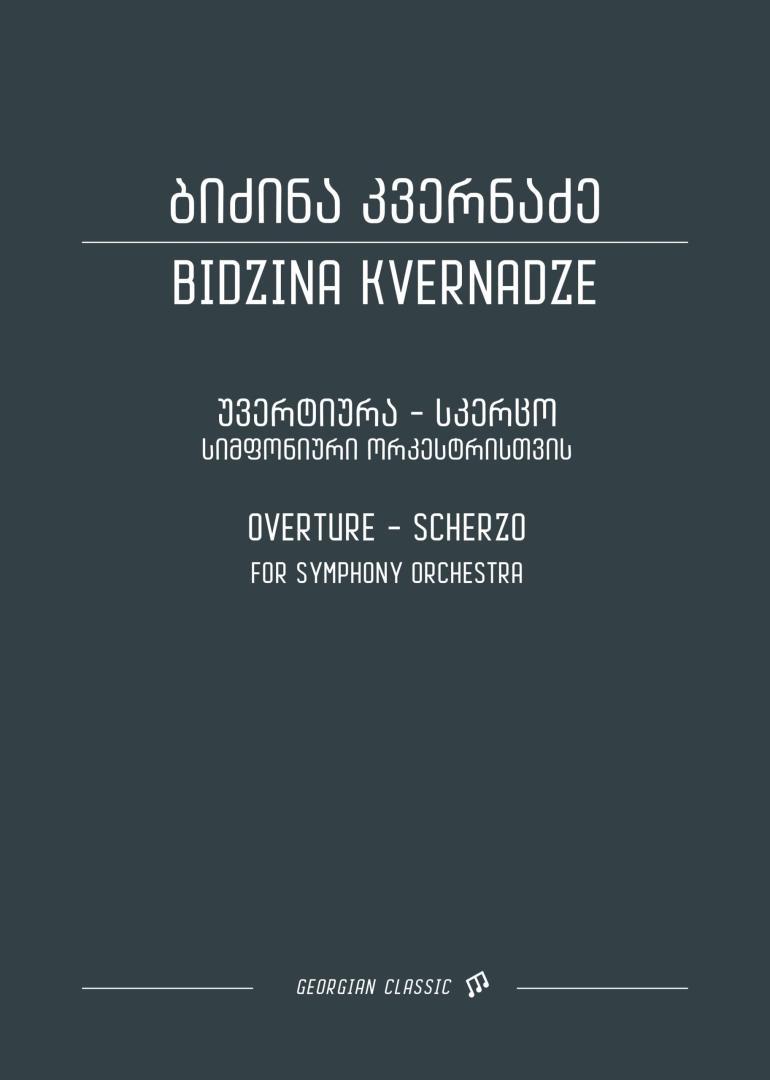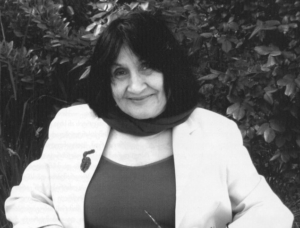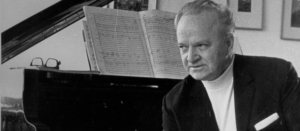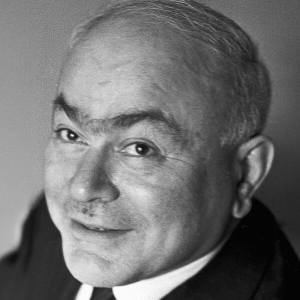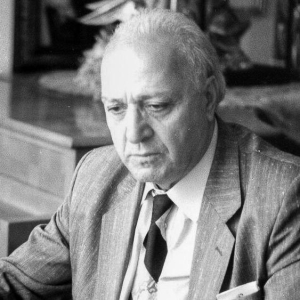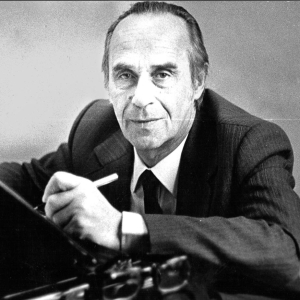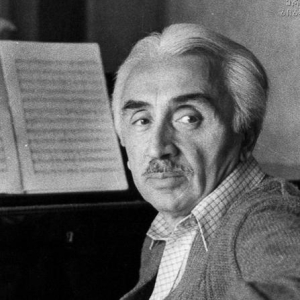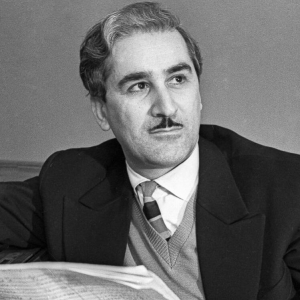Bidzina
Kvernadze
Bidzina Kvernadze
(1928 – 2010)
Bidzina Kvernadze, an outstanding Georgian composer, one of the outstanding representatives of the 60s generation. Bidzina Kvernadze’s work has established itself in Georgian professional music as a symbol of poetic nature, romance and lyricism. He is truly a composer of the Georgian spirit, and his creations are a visible and important stage in the development of Georgian musical culture. People’s Artist of Georgia (1979), laureate of Zakaria Paliashvili (1981) and Shota Rustaveli awards (1985)…
Date of birth – July 29, 1927
Place of birth – city of Sighnaghi, Kakheti, Georgia
Date of death – July 8, 2010
Place of death – Tbilisi, Georgia
He is buried in Didube Pantheon of Writers and Public Figures – Tbilisi
BIOGRAPHICAL DATA
1945 – Passed, Z. in Paliashvili musical gymnasium (decade of talents), string faculty (double bass);
1953 – Graduated from the Vano Sarajishvili Tbilisi State Conservatory with a degree in composition (Andria Balanchivadze’s class). In the same year, his graduation work, the symphonic poem “Evening on Mtatsminda” (according to Nikoloz Baratashvili) was performed by the Georgian Symphony Orchestra. conducted by Khurodze;
1953 – 1955 – Teacher of the theoretical department of Tbilisi Music School No. 9;
1955 – 1965 – Teacher of composition at II Music School;
1959 – At the “Transcaucasia Musical Spring” festival, B. Kvernadze’s concerto for violin and symphony orchestra. In the same year, the work was sent to the World Youth Festival in Vienna, where the author was awarded a commemorative medal.
Since 1963 – he has been teaching at the Tbilisi State Conservatory named after Vano Sarajishvili.
1971 – Docent of Tbilisi State Conservatory
1980 – Professor of Tbilisi State Conservatory
1996 – 2007 – Head of the Department of Composition of the Tbilisi State Conservatory
AWARDS AND RECOGNITION
1966 – Honored Art Worker of Georgia
1979 – People’s Artist of Georgia
1981 – Zakaria Paliashvili prize
1985 – Shota Rustaveli State Prize
1996 – Honorary citizen of Tbilisi
1998 – Order of Honor – for personal great contribution to the development of Georgian musical art, its popularization, fruitful creative and pedagogical work
2003 – Opening of the star named after Bidzina Kvernadze in front of the Great Philharmonic Concert Hall
2008 – Ilia Medal, “Always and everywhere, Georgia, I am with you” – for special contribution to Georgian culture and spirituality.
Bidzina Kvernadze
(1928 – 2010)
SELECTED WORKS
MUSIC FOR THE THEATER
1982 – “And it was in the eighth year” – Opera in 2 Acts – (libretto by Robert Sturua, after Jacob of Tsurtavi)
1987 – “Happier than we” – Opera in 2 Acts – (libretto by Robert Sturua, after Ilia Chavchavadze)
1991 – “Medea” – Opera in 2 acts – (libretto by O. Ioseliani, A. Chichinadze)
1997 – “Kolkhta Asuli” – Opera-poem in 1 Act – (libretto by L. Sanikidze, G. Lortkipanidze)
1964 – Choreographic Stories – ballet in 2 acts – (scenario by Z. Kikaleishvili, Guram Meliva, Chukurtma Gudiashvili, after Lado Gudiashvili), (one section may be performed separately as a concert work: Seraphita)
1973 – “Berikaoba” – Ballet in 1 Act – (Scenario by G. Alexidze)
1970 – Wives and Husbands – Operetta in 2 Acts – (libretto by R. Lezgishvili)
ORCHESTRAL MUSIC
1961 – Symphony N 1
1986 – Symphony N 2 – for String Orchestra
1953 – “To the Dawn” – Symphonic Poem
1959 – “A Fancy Dance” – for Symphonic Orchestra
1964 – “Seraphita” – (section of Choreographic Stories; may be performed separately as a concert work)
1968 – “Expectation” – for String Orchestra
1968 – Overture-Scherzo – for Symphonic Orchestra
1977 – Ceremonial Overture
1984 – Symphonic Overture
1979 – “Berikaoba” – Choreographic Poem for Symphony Orchestra
1955 – Concerto N1 – for Piano and Orchestra
1966 – Concerto N2 – for Piano and Orchestra
1956 – Concerto – for Violin and Orchestra
VOCAL-INSTRUMENTAL MUSIC
1971 – “Immortality” – Cantata for Mixed Choir, Symphony Orchestra and Readers (text – P. Gruzinski)
1971 – “Cantata about Georgia” – for Baritone, Mixed Choir and Symphony Orchestra
1974 – “My Entreaty “ – Vocal-Symphonic Poem for Mixed Choir and Symphony Orchestra – (text – N. Baratashvili)
1978 – “Ancient Georgian inscriptions” – for Tenor and Symphony Orchestra – (text – G. Leonidze)
1979 – Vocal-Symphonic Poem for Mezzo-Soprano and Symphony Orchestra – (text – E. Tataraidze and folk poetry)
2007 – “Ode to Georgia” – Cantata for Soloists (soprano, baritone), Choir and symphony orchestra – dedicated to the Catholicos-Patriarch of All Georgia, the Archbishop of Mtskheta-Tbilisi and Metropolitan Bishop of Bichvinta and Tskhum-Abkhazia, His Holiness and Beatitude ILIA II
1995 – “Pray Child” – (3 prayers) – for Soprano and Piano
2000 – “Autumn flowers” – Collection of Songs
CHAMBER-INSTRUMENTAL MUSIC
1952 – 1981 – Collection of Piano Pieces – “Burlesque”, “Improvisation”, “Joke”, “Poem”, “Musical Moment” N 1, N 2, N 3, “Humoresca”, “Ballad”
1995 – “Dance-fantasy” – Transcription for Piano (Transcription Author – R. Gorelashvili)
FILM AND THEATER MUSIC
MUSIC FOR THE THEATER – THE AUTHOR OF MUSIC FOR MORE THAN 40 PLAYS. INCLUDING:
“Business Man”, “Poetry Evening”, “There’s a Dog in the Yard”, “A Midsummer Night’s Dream”, “The Nettle”, “White Flags”, “Lovers”, “Burial in California”, “I See the Sun”, “The Torture of Shushanik” …
FILMOGRAPHY
1960 – “Levana” – director – Leila Gordeladze
1961 – “Verdict” – director – Levan Khotivari
1961 – “Singing Borjomi Christmas Tree” – director – Merab Jaliashvili
1961 – “Chiakokona” – director – Yuri Kavtaradze
1961 – “Unqualified Bride” – director – Levan Khotivari
1962 – “Daughter and Sun”– director – Merab Jaliashvili
1967 – “Meeting in the Mountain” – director – Nikoloz Sanishvili
1967 – “The City Wakes up Early” – director – Siko Dolidze
1975 – “Chiriki and Chikotela” – director – Levan Khotivari, Ramaz (Buba) Khotivari
1976 – “Wishing Tree ” – director – Tengiz Abuladze
1976 – “Love, Fire and Pompiero” – director – Guram Pataraya
1976 – “Pigs of Bakula” – director – Bidzina Rachvelishvili
1978 – “Data Tutashkhia” – director – Giga Lortkipanidze, Gizo Gabiskiria
1982 – “I will Return” – director – Merab Tavadze
1983 – “Book of Oath” – director – Giga Lortkipanidze, Amiran Darsavelidze
1985 – “In a Small City” – director – Giga Lortkipanidze
1985 – “Nylon Christmas Tree” – director – Rezo Esadze
1990 – “War Is War for Everyone” (son of Stalin) – director – Devi Abashidze
1990 – “White Bairaghi” – director – Giga Lortkipanidze
1991 – “Premiere” – director – Giga Lortkipanidze
1996 – “Ghosts of the Past” – director – Levan Tutberidze
2001 – “Antimoz Iverieli” – director – Giuli Chokhonelidze
DOCUMENTARY
1971 – “Georgia: Legends and Reality” – director – Giorgi Asatiani, Vakhtang Mikeladze
ANIMATION
1979 – “Adventure of Salamura” – director – Carlo Sulakauri
Bidzina Kvernadze
(1928 – 2010)
In Georgia, the name of Bidzina Kvernadze, brings up emotions that are evoked by the composer’s work. This is genuine of delicite lyric music for films, performances, as well as various professional music genres. Bidzina Kvernadze is a representative of the composers who entered Georgian professional music in the 1960s with a completely different style. His works are also built on the synthesis of national composition and modern composing techniques for the sake of the outstanding composers of this generation. Givi Orjonikidze, a musicologist came up with the term “Bidzina Kvernadze’s poetics” to describe the melodic-harmonious language and artistic features unique composing manner!
“Dance-Fantasy” is an orchestration (1959), The orchestration of “Dance Fantasy” 1959, which was written at the start of the composer’s professional life, was widely regarded as a significant statement. Despite the fact that Bidzina Kvernadze’s intonational language and expressive techniques developed over time, dance- fantasy remained a renewal of the micro-model, in which the collected features expressed himself in various ways in the composer’s creative work. It is the world’s poetic, emotional imagination; tonal drama’s crucial role;-rhythmic significance. As a result, the dominance of dance in the dramaturgical understanding of the work, as well as the eruption of elemental energy, improvisation, and the impulses that spread in a composer-like form in the future, with clearly expressed thematic material
The choreographic poem “Berikaoba” is created by the dynamic improvisation. (1963). “Berikaoba” This ancient Georgian ritual, dedicated to the God of Fertility, was an improvisational play. Bidzina Kvernadze’s ballet is also regarded as an improvised performance in which the traditional masked characters of “Berikaoba” participate. We can see a synthesis of theatricality and orchestral thinking in this work, which is so usual of Bidzina Kvernadze’s works. It should be mentioned that this is one of the works that represents the composing aesthetic value of the 1960s. The 20th meeting will take place here. The world of the century’s great composers was overwhelmed with pagan themes and allegorical-grotesque forms. When it comes to national literary works, Bidzina Kvernadze’s viewpoint is clear. In this case, influenced by the impressive vocal-symphonic cycle “Old Georgian Manuscripts” (1978). Poetry of Giorgi Leonidze to involve oneself in the national treasure while also keeping alive the art pieces, which the author frequently achieves through tonality and register coloring. One of the poems, which illustrates the mountain’s ritual, inspires the composer to speak with. The vocal-symphonic poem “Pshavuri Tirilebi” (1979), based on Eter Tataraidze samples and folk poetry, expresses the mountain world, strongly established the beginning in the composer’s worldview.
The opera “It was the sixth year” (1983), based on Iakob Tsurtaveli’s 5th century hagiographic work “The Torture of Shushanik,” was a completely new message in Georgian operatic storytelling. Director Robert Sturua staged the work at the Tbilisi Opera and Ballet Theater. With dramaturgy, both the opera and the play, in an extraordinary nature, triggered ambiguous responses. Bidzina Kvernadze’s impression of high-spiritual music remained unchanged. Both the opera and the play gained extensive applause outside of Georgia. These are works whose revival on stage will demonstrate Georgian opera’s uniqueness and modernity.
The performance of Bidzina Kvernadze’s various genre works at different times became a significant event both as for Georgia, also for other countries around the world. Piano and violin concertos, symphonies, ballet “Choreographic Novels,” opera “Daughter of Colchis” (first edition “Medea”), and other related to his success. From the beginning, he evoke admiration for his music for movies, plays, songs, and romances, and he achieved a special, universal love for the composer.
Musicologist
Tamar Tsulukidze
English Language Translator
Tamar Kharadze



